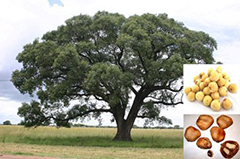Zibukile Gcinile Mchunu, a North-West University (NWU) master’s graduate from Nkandla, KwaZulu-Natal, conducted a study examining the effects of dietary inclusion of marula seed (kernel) cake on productive performance, health, gut metagenomes, and meat quality of indigenous Boschveld chickens.
She was supervised by Dr Doc Mthiyane from the subject group Animal Science, who has so far published several articles and is currently writing more on marula kernel cake utilisation in livestock and poultry nutrition to improve the productivity of the animals and birds.
The rapidly increasing human population, especially in developing nations, necessitates sustainable intensive poultry production to fulfil human protein needs. Indigenous chickens, the most common poultry species in Southern Africa's rural areas, offer an affordable source of animal proteins in the form of meat and eggs, while playing a vital role in the socio-economic wellbeing of these communities.
Despite this, their impact on human food and nutrition security remains limited due to inadequate nutrition, largely because of their reliance on scavenged feed resources. Additionally, commercial feeds are often too expensive due to high costs of, mainly, dietary protein sources, particularly the largely imported environmentally and economically unsustainable soybean meal.
Therefore, there is a need to seek cheaper and locally abundant alternative protein ingredients for poultry feeds such as marula seed (kernel) cake, the amino acid profile of which closely mirrors that of soybean meal. Native to sub-Saharan Africa’s semi-arid, deciduous and savannah areas, the marula trees are abundant in the North West Province and other parts of South Africa and produce sweet-sour fruits with yields of up to two tonnes per mature tree annually.
Their seeds contain kernels that are pressed to produce highly prized oil, the extraction of which yields the solid residue by-product (the kernel cake) that is rich in proteins (47% crude protein), metabolisable energy in the form of oleic acid-predominated residual oil, minerals (mainly calcium, phosphorus, and potassium), and numerous nutraceutical compounds.
Hence, Zibukile’s study aimed to evaluate the effect of dietary replacement of soybean meal with marula kernel cake on indigenous Boschveld chicken growth performance, carcass traits, viscera macro-morphometry, haematology and clinical biochemistry, gut metagenomes, and meat and bone quality.
In her study, 400 three-week old Boschveld chicks were randomly allocated to five isonitrogenous and iso-energetic maize and soybean meal-based grower diets supplemented with 0%, 10%, 15%, 20% and 25% marula kernel cake replacing soybean meal for nine weeks.
Published in Veterinary and Animal Science journal, her findings demonstrated that feeding of up to 15% dietary marula kernel cake is nutritionally safe for indigenous chickens whilst detrimental to bird appetite, growth and meat yield, however without significantly affecting their physiology, at higher inclusion levels.
As marula kernel cake contains residual oil that is predominantly composed of oleic acid, the omega-9 fatty acid that enhances good health among human consumers, and has significantly higher oxidative stability than most oils, future studies will endeavour to optimise the kernel cake’s inclusion in chicken diets as a strategy to produce healthier meat and eggs with extended shelf-life.

Zibukile Mchunu is a master’s graduate from the NWU.

Marula seed (kernel) cake.

Marula tree, fruits and kernel ( bearing seeds).
